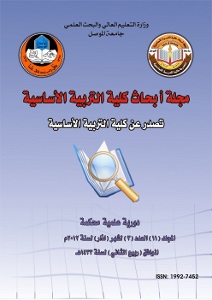The Scope of Enrichment in the Holy QuranA semantic or connotative study
Abstract
. ( ) . . . . . . " " " . : - ( ) " () . " . () . ( ) () () : ( ) (). This piece research revolves around semantic or connotative studies of the holy Quran which enter within the field of linguistic interpretation of the holy Quran by connecting linguistic senses with the genera context so that the intended sense or meaning of the verse may became clear therefore, we have chosen the word Enrichment that is to say, the transitive verb followed by Al-Hamza (enrich-enriched) in order to be the subject-matter of our research. Since it has many connotations discussed throughout the study we have started our study by enumerating the positions within which this verb has been mentioned in the holy Quran, and divided these positions into semantic or connotative scopes according to the theory of semantic scopes or fields concerned with studying the meaning and defined as that body of words closely connected with one another in their sense and come under a general and comprehensive title.The principle range in our study, therefore, is the enrichment and this range may be subdivided into sub-scopes so as the principle scope of any verb may be determined on the basis of the general linguistic sense characterized by the aspect of generality, whereas the medium & scope of the same verb is the considered as the particularization of that generalization, while the sub-scope has been determined by the context of the verb and its varieties.The subject-matter of this study, that is to say, the locations within which the verb of enrichment has been mentioned in the Holy Quran according to the semantic or connotative scopes, so that we can dispense with the intended sections and subsections, before analyzing most of the locations of the enrichment verb in the holy Quran with the semantic or connotative analysis based upon clarifying the general lexical sense of the verb by having recourse to linguistic lexicons before clarifying its precise meaning within the verse, and we have connected this sense with the general context of the text by resorting to interpretative references and Quranic studies and we have relied upon the annotative aspects of the text as well as its expressions.The study ends up into a variety of results and as follows:- The verb (enrich, enriched) has been mentioned in the holy Quran, expressing one of the two origins of the non-finite verb (being enriched) that is to say (the sufficiency) but it goes back to this origin what we have found in analyzing the holy verses concerning the sense of pushing, benefit, making use of something, preventing and enrichment by wealth, and we have found that the most sense mentioned in the holy Quran is the sense of pushing, avoidance of torment and need.- The Hamza referred in the verb (to enrich) to the sense of transitive verb.- We have also found that the verb of enrichment becomes transitive in itself, that is to say (to enrich you to enrich them etc.) if used with the believers and becomes-transitive by (of) with the disbelievers as in the saying of God the most merciful, the most compassionate (the disbelievers cannot make use of them).
